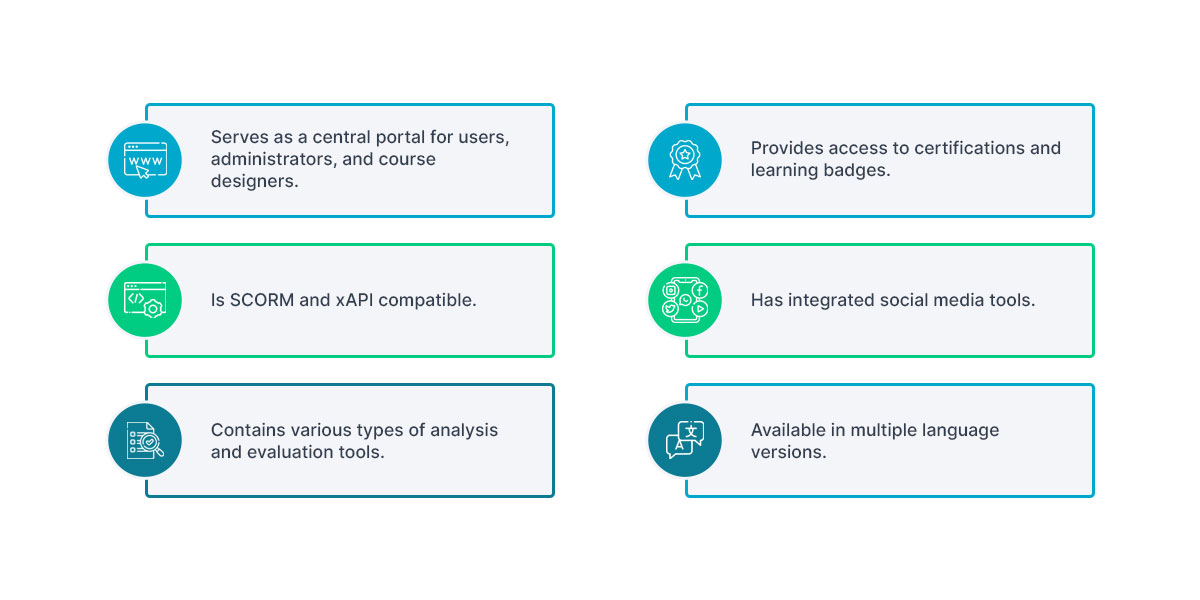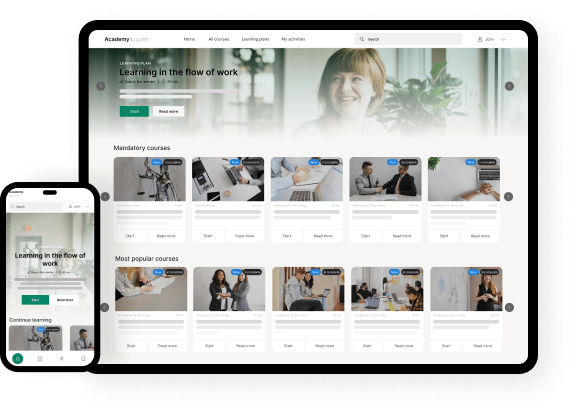If you work within learning and development you may have heard the abbreviation LMS before. However, with all the abbreviations that exists, it can be difficult to remember the definition of each. LMS stands for Learning Management System. What exactly it is, you’ll find out further down the page. So, read on if you want to know what an LMS is and how it ensures your business maximum efficiency.
What exactly is an LMS?
A Learning Management System – sometimes also called an LMS system – is a cloud or web-based platform. The platform helps you easily manage your organization’s learning and training programs. You can look at it as a combined library, administration, and classroom all in one system. With an LMS, you can create and adapt learning materials and learning paths, deliver e-learning courses, and access data. Your learners can in turn access your learning content when and whenever it suits them.
In other words, an LMS is an adaptable online learning hub. You can use it to support traditional face-to-face instruction, but it’s also highly compatible with blended learning or hybrid learning as well as distance learning environments.
Depending on your needs and the LMS provider, the usage and functions of the system can vary. However, an LMS always has some common features:

Before choosing an LMS, you must therefore clarify your needs and desires. Doing that will help you make the right choice the first time around.
Why use an LMS?
If you work with any kind of learning and development program or activities, you can benefit greatly from having an LMS system.
Whether you need to conduct internal training or want to offer external training, you can use an LMS.
A Learning Management System works for every thing from onboarding to distributing your own courses and as an upskilling platform for competency development purposes. How you use your LMS depends entirely on your organization’s needs and processes.
With an LMS you can gather all learning materials in one place. The system moreover helps you disseminate learning materials in different formats and across different media. This all makes managing learning programs significantly easier. And when it comes to the learner, they’re given a better learning experience by not having to access instructional materials in different places.
Having a system to gather all learning materials, learning objectives, and user data in one place has a number of benefits. For example, an LMS allows you to create a more smooth and efficient distribution. It also makes scaling easier and data collection a breeze. And we all know that “data is king”.
In short, an LMS is a system that gives you a solid focal point for everything related to courses, teaching, learning materials, and the administration hereof.
Who can use an LMS?
A Learning Management System can, for example, be used for onboarding employees, compliance training, management and employee development, or selling digital products such as e-books or online courses.
This means that almost any business can profit from an LMS. And whatever your needs are, we believe an LMS could boost your organization as well.
An LMS is beneficial for you if you want:
Effective and flexible distribution of learning materials
An LMS can be accessed anywhere, anytime. This means that you can offer an extremely flexible solutions no matter if it’s for teaching employees or disseminating learning materials to customers.
Safe and easy management and storage
Your LMS system lets you keep track of all your material from one single access point. And storing materials in the cloud furthermore reduce the risk of losing your content. At the same time, it becomes easier to manage learning paths, learning content, and the distribution of these.
A personal learning experience and user tracking
With an LMS system, you can easily tailor your learning paths to provide a personal learning experience. This often result in higher user engagement. At the same time, you get the opportunity to set performance goals, collect data on your users, and keep track of their progress and results.
Opportunity to disseminate content to a larger audience
Do you run an expert business? If yes, there’s absolutely nothing to discuss – an LMS is a must for you. If you run a traditional consulting business and do not sell your knowledge online, you should consider getting an LMS straight away. Selling expert knowledge online as e-learning courses through an academy has become very popular in recent years and will most likely stay popular for a long, long time.
Our online academy is built on top of our powerful LMS, giving you much greater control over your knowledge.
Read more about how to turn your service into a scalable product here. Or read our guide on how to get started with your own online academy – it’s a lot easier than you might think.
Get started with your own LMS
There’s no doubt that an LMS is a beneficial tool in all businesses – large or small. The wealth of advantages coming from the system’s many usage options are undiscussable. However, if you find it difficult to choose the right LMS for your needs, we understand.
At Cursum, we’re always ready with expert insight and advise to lead you towards the best solution for your company.
The purpose of an LMS is to make it easier and more efficient for you to manage learning content. Therefore, usability is essential when choosing an LMS.
Usability is, of course, a broad concept. For this reason, we always recommend that you test out an LMS before deciding on it. This is the only way you can decide if you like the interface and find it intuitive. Our guess is you probably wouldn’t buy a car without trying it out either. Right?
So, if you book a non-binding strategy meeting with us, you’ll of course also get a free demo of our online academy.


